Ongoing events:
 Art Today Association
Art Today Association
Center for Contemporary Art - Plovdiv
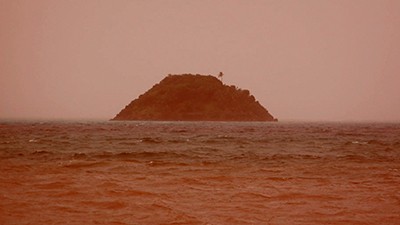
Ursula Biemann, Subatlantic, 2015. Video still.
Operaismo Naturale: Ecology of the Event
Fold 1 of Digital Ecologies 2018-2019: a project in two folds
at the Center of Contempoary Art ‘Ancient Bath’ (6th September Str. 179) and the former tobacco warehouse SKLAD (Ekzarh Yosif Str. 16) in Plovdiv, Bulgaria.
With works and interventions by Donatella Bernardi, Ursula Biemann, Luchezar Boyadjiev, Delphine Chapuis Schmitz, Voin de Voin & Simone Gilges, Jonas Etter, David Jacques, Monica Ursina Jäger, knowbotiq, Dominique Koch, Marlene Maier, Boyan Manchev, Angela Melitopoulos, Uriel Orlow, Ursula Palla, Elena Peytchinska, Elodie Pong, Isabel Reiß, Oliver Ressler, Dorothea Rust, Kerstin Schroedinger, Pascal Schwaighofer, Sandro Steudler, Axelle Stiefel, Kamen Stoyanov, Milva Stutz, Katharina Swoboda, Una Szeemann & Bohdan Stehlik, Lena Maria Thüring, and Alexander Tuchaček.
Curated by Dimitrina Sevova, co-curated by Katharina Swoboda and Emil Mirazchiev.
27 July to 5 September 2018
Opening: 27 July 2018 (detailed program of events on 28/29 July forthcoming)
Digital Ecologies is composed of two folds of a large international exhibition project and takes place across two venues, the Ancient Bath and the former tobacco warehouse SKLAD in Plovdiv, Bulgaria. The first, an exhibition project with talks, interventions and performances, takes place from 27 July to 5 September 2018 under the title, Operaismo Naturale: Ecology of the Event; and the second, an expanded exhibition project building on the first exhibition and its context and participants with an accompanying symposium, from 4 May to 29 July 2019 (symposium on 5/6 May 2019).
Digital Ecologies brings on display art works that exhibit an engagement with ecological domains to constitute a constellation of eco-art and emancipatory art practices of committed aesthetic inventions. They have ethical implications in the age of meta-data and the political economy of valorization of information under post-internet conditions, and in the troubling times of rapid and unpredictable climate change associated with global warming. The exhibition project is a platform to display, but also a laboratory for joint research to invent new concepts, affects and percepts – a space of transmission of ideas on how to transform knowledge into practice, and practice into knowledge, with its own temporality.
Operaismo Naturale revolves around the urgent questions of what kind of aesthetic practices can urge ecological thought through the multitude of artist practices on display in a multivalent project. There is some wonder what concept of ecology to embrace, or rather the resonances among so many concepts, some of them contradictory, but welcome as ‘Ecologies of Nothingness’ and its voiding love in troubled times, ‘Ecology without nature’ or ‘Dark ecology.’ The project encourages the viewers to explore the potentiality of this “dark precursor” that opens up a new passage of ecological thinking. How do these eco-logical sensibilia of what are doubles of thought relate to the issue of brain creativity that can be grasped as leaving room for more creative tracings? What kind of ecology can happen in the dark room, and how does ecological awareness actually start with the little glimmering in the dark depths of vast nature? This is the ecology of a black box and its lighting system of immediate and infinite reversible movements of lightning flashes. A Furling Machine that creates new ways of seeing and hearing, new ways of feeling, a logological cabinet (by extension curious) that ‘exhibits’ a will to form and affect plasticity.
Operaismo Naturale: Ecology of the Event takes inspiration from the desire by Deleuze & Guattari to write a philosophy of nature in which any distinction between nature and artifice becomes blurred. The ultimate volume of Philosophy of Nature remains an unwritten project in the body of their collective work, in the channels of their non-linear micro-logic of philosophical ideas. It leaves an unoccupied space for us to speculate, to fabulate, to experiment what and how such a philosophy could be that is inevitably a matter of aesthetics and ethics. The unwritten Philosophy of Nature is a project of naturalist materialism in science-fiction that remains an open work, a threshold for ‘heretic’ ideas in the blurred zone between nature and artifice, or what Michel Foucault called points of heresies, which correspond to Deleuze and Guattari’s “Event-centered singularities” and resonances between them that make up the diagrammatic feature of the plane. Their physical magnitude can unexpectedly take us off in a new direction, where there is no longer a need for speculative unity between nature and spirit or between nature and technology, but rather ecologic modulations of micro brains’ plasticity. The plastic forces operate between the organic and inorganic, between human and non-human. Their plastic method is not so much a transformation of one into the other but something passing of one into the other to anticipate the future of social and politico-aesthetic change.
A project of Art today association, Plovdiv in collaboration with Corner College, Zurich.
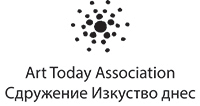

This project is part of the official program of Plovdiv 2019, European Capital of Culture.
It is supported by the Municipal Foundation Plovdiv 2019, Pro Helvetia, Goethe Institut Sofia, the Federal Chancellery of Austria (Bundeskanzleramt), the Austrian Embassy in Sofia, and organized by the Art Today Association.
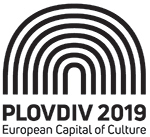




 Art Today Association
Art Today Association
Center for Contemporary Art - Plovdiv
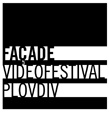 Open Call
Open Call
Facade Video Festival 2018
Artists from all over the world are invited to send their video art to Plovdiv, Bulgaria.
The Art Today Association /Center for Contemporary Art, Plovdiv/ will
host the 9th edition of the Facade Video Festival between 28th and 30th
September 2018.
The Facade Video Festival connects people, art and urban environment by
projecting videos onto the walls of houses in the historic city and
around.
Videos should be submitted before 30th April 2018.
There are no restrictions concerning the theme.
You can find out more about the Facade Video Festival and the Open Call on
www.facade.arttoday.org
 Art Today Association
Art Today Association
Center for Contemporary Art - Plovdiv
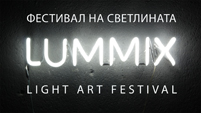 LUMMIX Light Art Festival 2017
LUMMIX Light Art Festival 2017
THE PROJECT IS PART OF THE PROGRAM OF PLOVDIV -
EUROPEAN CAPITAL OF CULTURE 2019
LUMMIX is a festival dedicated to showing artistic projects
developed with the use of light. In the period until 2019 three
upgrading one another editions of LUMMIX are planned to be realized
annually in Plovdiv – within the main programme of Plovdiv – ECOC
2019.?This year LUMMIX is happening in a day – on October 28, Saturday,
in the area of Stolipinovo neighbourhood, 81 Landos str., over the
concept Under the Lights of the Projectors.?In the duration of two weeks
period young people from the neighbourhood will work with the
mentorship support of professionals to create together a light art
installation. In the public event, on Saturday, this installation will
be presented to the audience – skillfully integrated within the whole
festive atmosphere, including also music, dances, light.
LUMMIX is a project by Art Today Association in partnership with
Municipal Foundation „Plovdiv 2019“ and Goethe-Institut Bulgaria.
Media partners: BNT2, Radio Katra FM, Pod Tepeto, Kapana
 Art Today Association
Art Today Association
Center for Contemporary Art - Plovdiv
The Ancient Bath
23st edition of the WEEK OF CONTEMPORARY ART 2017
MIGRATIONS OF FEAR
07 - 27.09.2017
THE PROJECT IS PART OF THE PROGRAM OF PLOVDIV -
EUROPEAN CAPITAL OF CULTURE 2019
Curators:
Ilina Koralova, Boris Kostadinov
Artists:
Azra Aksamija, Nika Autor, Lana Cmajcanin,
Petya Dimitrova, Fanni Futterknecht, Emil Mirazchiev, Alban Muja, Oliver
Ressler, Kamen Stoyanov, Ute Richter, Borjana Ventzislavova and Mladen
Penev, Clara Wildberger
Fear is a basic, natural, defensive reaction to danger, which could
reveal itself in acts of aggression, surrender, or retreat. However, in
contrast to the inhabitants of Nature, fear has a much wider range of
manifestations among human beings: from the mere physical annihilation
of the bearer of the alleged danger to the more subtle ways of
expression, such as hatred, prejudices, intolerance. Human fear could be
justified, but also illusory, a symptom of a mental disorder or a
result of some kind of manipulation, exerted on an individual by other
individuals. It is not only psychological, but also social phenomenon,
and, as such, it belongs to human history and society.
The 21st century, marked by the events of 9/11, gave worldwide rise to
an ever-growing fear and anxiety, that were unknown to some extent to
the western societies at the time, and that have recently taken
unprecedented proportions, due to the terrorist attacks in Europe, the
refugee wave and the subsequent humanitarian crisis. Various researches
have shown that migration and terrorism are what the Europeans now fear
most. However, fears of unemployment, of the deepening social
inequality, of personal failure or financial ruin have been lurking in
the old, as well as in the newly-born, capitalist societies for decades.
The refugee wave only gave one last powerful impulse, which unlocked
what has already been suppressed, more or less, for some time.
Instability and constant threat gave impetus to the nationalist and
far-right movements. The scepticism about the concept for a united
Europe has intensified among the population of the EU member-states.
This is where the project MIGRATIONS OF FEAR takes its starting point.
It evolves around the real, phantom, individual or common fears in
general, which have surfaced in the last few years. Those fears, and
above all the ways the contemporary (European) society could find in
order to defeat them, are the spheres, which the project intends to
explore.
Artists from Germany, Austria, Bulgaria and Slovenia, as well as from
Bosnia & Herzegovina, Croatia, Kosovo among others, are invited to
show their art works in the art-institutions, participating in the
project. The works will present different concepts and viewpoints on the
fears of the contemporary society, such as the fear of the
unknown/foreign/different; fear of the loss of social status, fear of
poverty; fear of the loss of basic freedoms. Fear is examined as a
social and political phenomenon, as well as in its very subjective
forms, as part of the individual’s very existence.
MIGRATIONS OF FEAR is a reaction to the actual political and social
reality in Europe. The project and its participants aspire to contribute
to the process of overcoming hatred, prejudices and intolerance, which,
more than terrorism, constitute the actual threat for the contemporary
European society.
“Week of Contemporary Art” is a project by Art Today Association in
partnership with Municipal Foundation „Plovdiv 2019“ and Goethe-Institut
Bulgaria.
Supported by:
Bundeskanzleramt ?sterreich, Sektion II Kunst und Kultur
EUROPAS ZUKUNFT Gesellschaft zeitgen?ssicher Kunst Leipzig
Gaudenz B. Ruf Award For New Bulgarian Art
Media partners: BNT2, въпреки.com, Radio Katra FM, Mediacafe, Pod Tepeto, Kapana
WORKING HOURS
Tue - Sun
10.30 –18.30
MONDAY – DAY OFF
Entrance free




Archive page 1 2 3 4 5 6 7 8 9 10 11 12 13 14 15 16 17 18 19 20 21 22 23 24 25 26
Annual edition of the Week of Contemporary Art:
Art Positive:
- 2016 - Negative
- 2015 - Отклонение
- 2014 - "ФОРМАЛНО"
АРТИСТЪТ ПРИСЪСТВА ФОРМАЛНО НА З/зЕМЯТА
- 2013 - Analog
- 2012 - Mini
- 2011 - Elasticity
- 2010 - Optimism
- 2009 - Sweet
- 2008 - Fragment
- 2007 - Art robs
- 2006 - Light
- 2005 - CD - way of usage
- 2004 - Art Positive
Communication Front- new
media art and theory
Critique of Pure Image – Between Fake and Quotation
Guest Exhibitions:
news & event | about us | the team | arttoday lab | partners | links | contact us
© Arttoday Association 2009





 Art Today Association
Art Today Association

![]()





 Art Today Association
Art Today Association 
 Art Today Association
Art Today Association 
 Art Today Association
Art Today Association